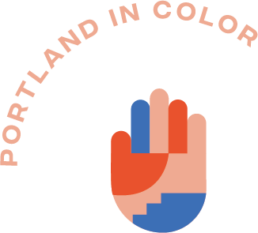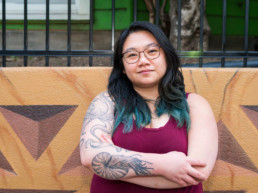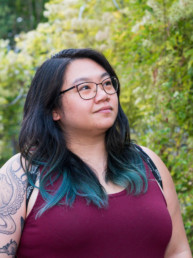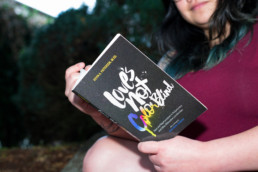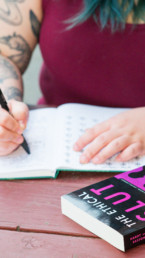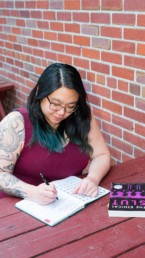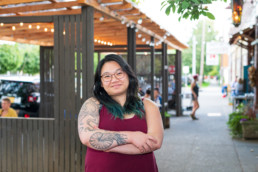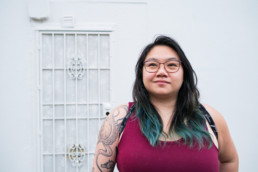MICHELLE HY
“I like to emphasize that all relationships are political.”
Name: Michelle Hy
Pronouns: she/her
Background: Second generation Chinese American. Born and raised in the Portland Metro Area. Went to school at Portland State University for applied linguistics, which I don’t do anything with specifically. For my 9-5 job, I do social media work, but about a year and a half ago, I started doing content creation around non-monogamy from a more intersectional lens through my instagram @polyamorouswhileasian. I’ve been polyamorous since 2012. I’m also a mother of 2 cats.
Karaoke jam: Either “Killing Me Softly” by the Fugees or “You Know I’m No Good” by Amy Winehouse
Local artists you’re excited about: Linneas Godbey
INSTAGRAM
@polyamorouswhileasian
CASHAPP
$polyamwhileasian
VENMO
@Michelle-Hy
polyamorouswhileasian.com
Portland has a very sex-positive reputation, most notably as the city with the most strip clubs per capita in the United States. Yet, many of the most visible voices promoting sex-positivity and polyamory, have been noticeably caucasian—leaving polyamorous people of color largely unseen. Michelle Hy is working to change that through her platform @polyamorouswhileasian, created in 2020. Hy started the Instagram account as a way to see herself and others who felt marginalized in the polyamorous community. Through her ongoing “Non-Monog Dialogue” series, monthly “Ask Me Anything” events, peer support sessions and other projects and curated resources, Hy is helping change the face of ethical non-monogamy and expanding the discussion in a necessary and timely way.
How does being in Portland shape your approach to making sex-positive content?
I remember as a kid, we would joke about being one of the only Asian families around. It seemed like a lighthearted thing. But getting older and learning about the very racist history of Portland and Oregon as a whole, it’s very illuminating and very disturbing. I think a lot of the stuff I do around nonmonogamy, it’s seen as white people shit. It doesn’t help that within Portland, which is already super white, that this smaller sub-community of non-monogamy and polyamory is super, super white. So navigating the often more subtle tentacles of white supremacy that seep in, even from well meaning folks, it’s very complex. I’m 28 years and still sifting through it.
There’s such a rich amount of voices out there and so many different experiences. There’s just so many factors and impacts that a lot of white people–it just never occurs to them at all.
“It’s trying to move away from the idea that in order to be in a successful relationship, to be a successful person, you have to follow these steps: You have to date and then get married and then have kids and then [buy] a house.”
Can you talk about using conversations around polyamory and non-monogamy as a vehicle for exploring race, racism, and racial justice?
I like to emphasize that all relationships are political. For a lot of people who disagree with that or don’t see that happening, very often it’s because they exist within the status quo. They exist within the warm embrace of the status quo and conventional scripts, but politics is just about how we relate to one another, how we relate to society as a whole and how we believe power should be distributed. So when we talk about non-monogamy, it’s more than just talking about how we deal with jealousy and how we deal with metamours and all that.
It really relates to large topics of, why do we do relationships the way we do? How does our interaction with certain people in certain spaces affect the types and quality of relationships that we’re allowed to have? It totally relates to racism, classism, ableism, sexism. All of the politics around those issues and those interrelated systems of oppression affect how we’re able to love other people or receive love from other people. I know there are a lot of people who go into polyamory just to figure out how they can have more partners and stuff, but there’s just so much social justice stuff and politics tied to it. It’s super related and I think people who don’t think that it is, I think it comes from a place of privilege.
Can you talk about how you try to make polyamory concepts more conversational and accessible?
I have no interest in going out and proselytizing to people. I have no interest in being like, “Hey, have you read The Ethical Slut? If not, take this brochure, take this book.” I’m not interested in changing people’s minds specifically. If my work does change some minds or help people think about non-monogamy or relationships differently, then cool. But I think my audience, whether or not they want to pursue non-monogamy, they’re people who are curious.
I try not to use a lot of fancy words. If I do use vocabulary, I try to break it down. I don’t try to come at it as an expert because I’m still trying to figure so much shit out myself. It’s a lifelong project of just figuring out life so that’s why I try to focus on lived experience and speaking from a lot of personal stories and accounts. Social media is a very curated space. A lot of the time, we only show what we carefully pick out. Maybe only the good things. The perfect moments and stuff. I’m here to show you I’m the kind of person who is very introverted and awkward and socially anxious and I have panic attacks and things. I go to therapy. Also, I really feel like I’m living my best life being a polyamorous person, and you can too. It’s possible.
For me, it’s very important to try to show people that polyamory is just like anything else. It’s very mundane. It has it’s trials and tribulations. It’s not impossible. It’s not this weird, fringe, far-off thing. It is attainable for many people. You don’t have to be perfect or fully healed. You just have to want it and be committed to doing the internal work and interpersonal work.
One of the things you provide are peer support sessions. Can you describe what a session would entail?
With peer support, it’s very casual. I like to emphasize that I’m not a therapist. I’m not trained to help with trauma and create plans for people like that. Really what the sessions are is to create a safe, confidential, more casual space where people can just tell their stories. Sometimes people just need to lay it out on the table because they have no one else to talk to about it without fear of judgement or ostracization. People tell what their situation is, what they’re curious about or what questions they have. I empathize where I can, provide parallels from my own experience, and have questions they can help process themselves because I’m not here to tell people what to do. It’s pretty casual. Very conversational. It’s really just carving out a safe space for people to express themselves.
You were recently on Red Table Talk. Can you just talk about the reception you’ve got and how being on Red Table Talk has affected your business profile at all?
It might be funny to say, but I actually don’t talk about non-monogamy and polyamory much in my day-to-day life outside of the page. It’s just a part of my life. I do it because it is fun. It’s very rewarding getting feedback from people that are like, “Wow, you put my thoughts and feelings into words.” Or other Asians. One of the big reasons I started the page is because I didn’t see any other Asians and I was looking for them. I felt like I could be safely out about it. Other Asians would DM me and be like, “I can’t be publicly out, but it’s really cool to see another polyamorous Asian and I don’t feel as alone and there are other people out there.” I guess I don’t see it as a business. It’s cool to be paid for labor, paid to educate. I’m mostly able to do it because I can be out and I don’t know what my plans are going forward. I just take it a day at a time. Appearing on things like Red Table Talk is still surreal to me. I’m just going to continue doing what I do. Hopefully I’ll stay humble and grounded. Hopefully people will keep me accountable and humble and grounded and we’ll continue to just learn together.
This work was made possible in part to a Make | Learn | Build Grant from the Regional Arts and Cultural Council.
